Key takeaways:
- Certification bodies enhance business credibility by establishing standards and conducting assessments, leading to increased customer trust and market differentiation.
- Third-party certifications serve as powerful marketing tools and drive continuous improvement within organizations, ultimately benefiting consumer confidence and business practices.
- Challenges such as maintaining credibility, rapid technological changes, and financial constraints impact certification bodies, while future trends indicate a move towards agile standards and digital integration.
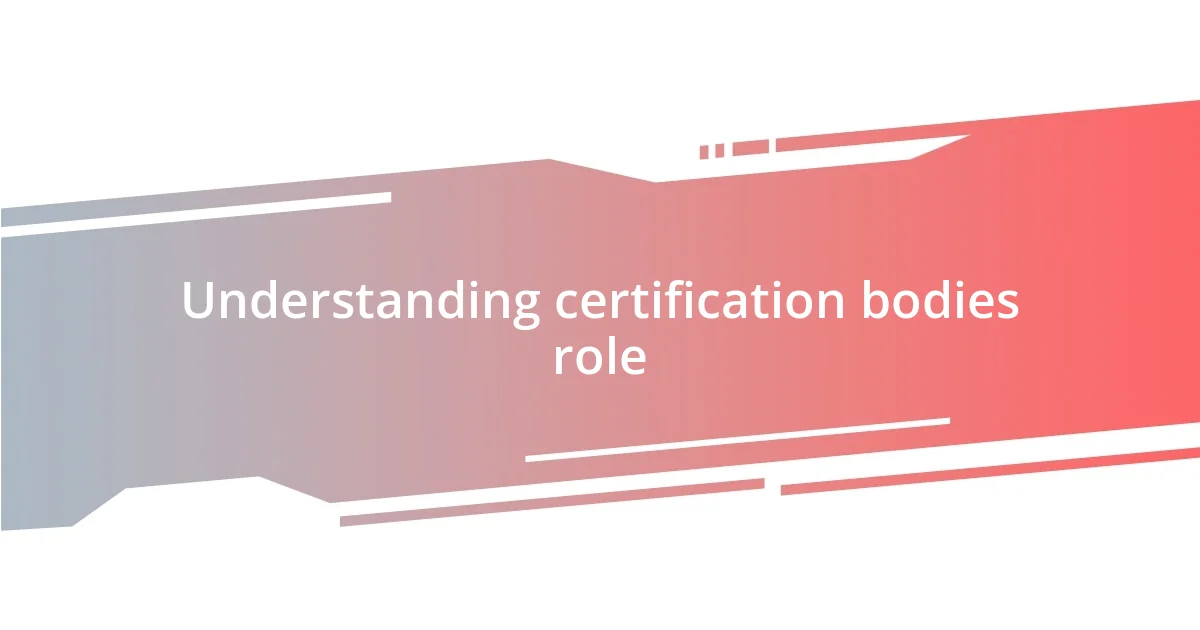
Understanding certification bodies role
Certification bodies play a crucial role in establishing trust and credibility in various industries. I remember the first time I sought certification for my business; I was amazed at how much it elevated our reputation among clients. It’s like having a stamp of approval that reassures customers that we adhere to certain standards.
These organizations not only define the standards but also ensure that businesses comply through rigorous assessments. Can you imagine the peace of mind that comes from knowing an independent body is evaluating your practices? I often think about how this oversight helps create a level playing field, fostering competition that ultimately benefits consumers.
Moreover, certification bodies provide invaluable resources and support for companies looking to improve. I once participated in a workshop offered by a certification body, and it was eye-opening to see how they shared best practices. It made me realize that their role goes beyond just certifying—it’s about empowering businesses to thrive and adapt in an ever-changing market.
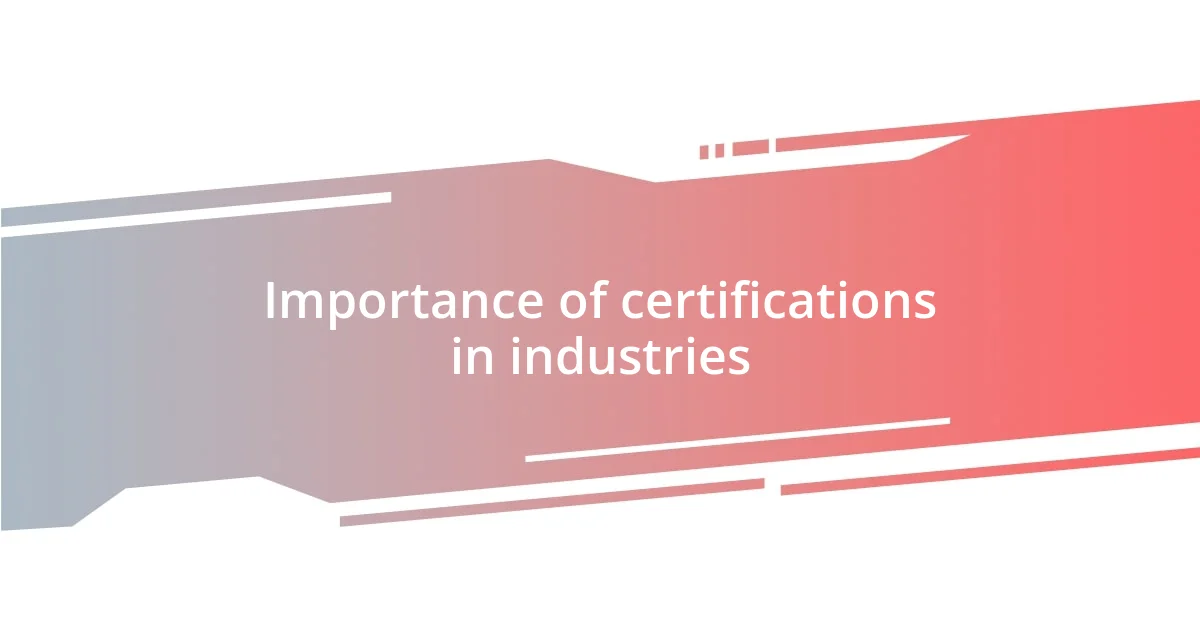
Importance of certifications in industries
Certifications hold immense importance across various industries, acting as a benchmark for quality and reliability. When I first started exploring certifications, I found it eye-opening to see how they directly impact customer trust and brand loyalty. Customers often prefer certified products or services because they feel assured that these options meet specific standards of excellence.
Here are a few reasons why certifications matter:
- Trust Building: Certifications instill confidence in customers and stakeholders, affirming that a company adheres to high standards.
- Market Differentiation: In competitive landscapes, certification can help businesses stand out and attract clientele looking for reliability.
- Continuous Improvement: Pursuing certification often leads companies to adopt better practices, resulting in overall improvements in quality and efficiency.
My participation in several industry events highlighted how many businesses leverage certifications to demonstrate their commitment to safety and environmental responsibilities. I remember a small food company that shared its journey toward organic certification; their passion was infectious, reflecting not just a commitment to quality, but an emotional connection to sustainability that resonated deeply with their customers. Engaging stories like that truly illustrate how certifications are more than just paperwork; they’re a means of expressing values that people care about.
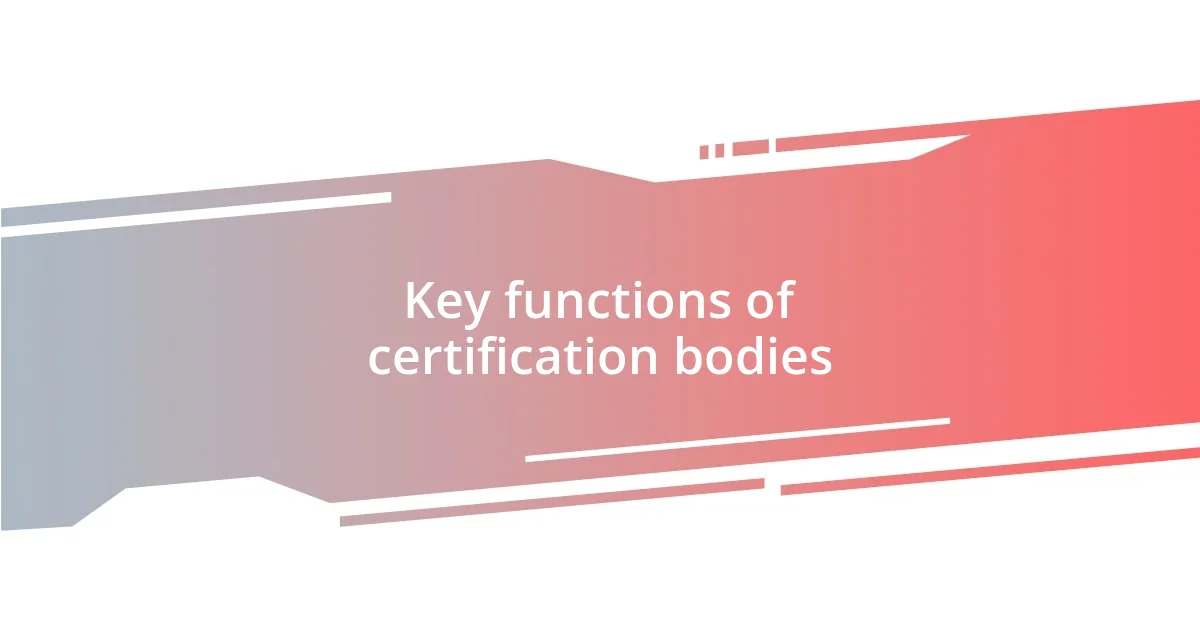
Key functions of certification bodies
Certification bodies have several essential functions that significantly contribute to industry standards. One primary function is developing and verifying standards that companies are expected to meet. I remember a time when I was confused about which standard to adopt for our processes. Certification bodies stepped in, providing clarity and guidance. This not only streamlined our processes but also left me feeling more equipped to face industry challenges.
Another vital role is conducting audits and assessments. These evaluations are crucial, ensuring that companies consistently meet defined standards. I can’t stress enough how reassuring it feels to know that someone impartial is reviewing our practices. It encouraged my team to be more diligent and proactive in maintaining quality, and I often find that the feedback we received during the audits led to unexpected improvements.
Lastly, certification bodies offer continuous education and resources for companies striving to maintain or achieve certification. I once attended a seminar organized by a certification body. The insights shared about emerging trends and effective strategies were transformative for my business. It highlighted that their responsibilities extend far beyond merely assessing compliance; they are there as partners in growth, fostering a culture of excellence.
| Function | Description |
|---|---|
| Developing Standards | Defines a clear framework of requirements for companies. |
| Conducting Audits | Evaluates adherence to standards through regular assessments. |
| Providing Resources | Offers educational tools and support for continual improvement. |
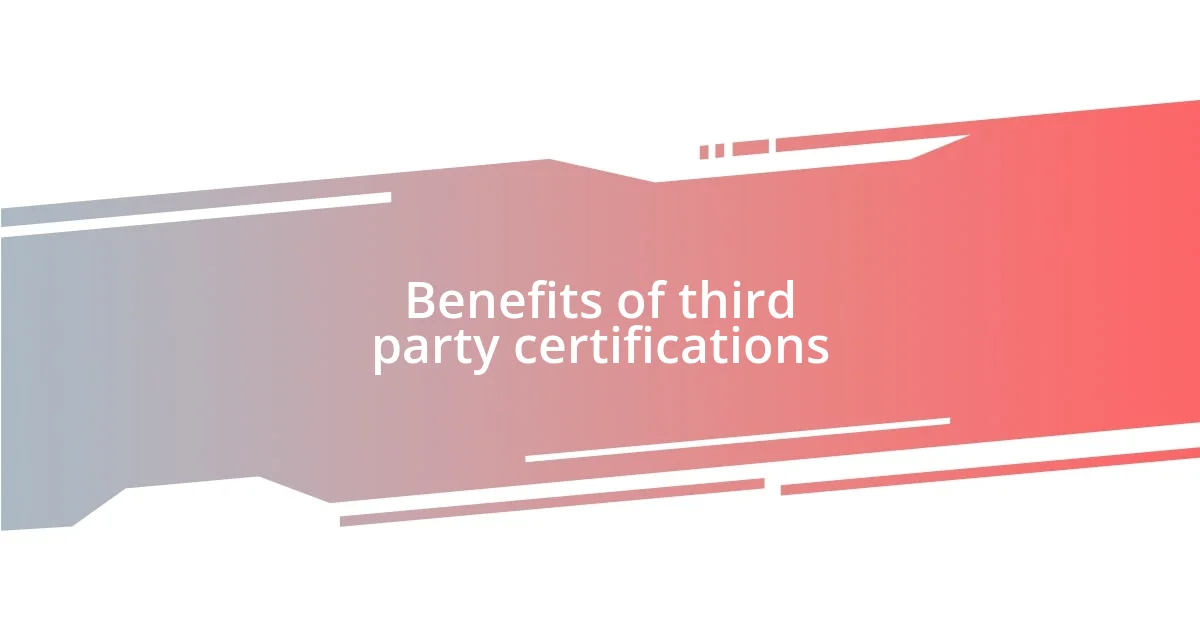
Benefits of third party certifications
One of the most profound benefits of third-party certifications is the sense of reassurance they provide. I recall an instance when a friend of mine was torn between two service providers for a major home renovation. The certified company instantly gained her trust. She felt secure knowing they met stringent standards, and it made all the difference in her decision-making. It’s amazing how a simple certification can alleviate doubts and build confidence, isn’t it?
Additionally, these certifications often serve as a strong marketing tool. In my own experience, products that bear recognizable certification logos stand out on the shelves. I once chose a brand of organic snacks mainly because it proudly displayed its certification. That label wasn’t just a stamp; it was a commitment to quality and safety that resonated with my values. This shows how certifications can effectively attract consumers who prioritize reliability and are willing to invest in brands they can trust.
Moreover, the journey to certification can lead to significant process improvements. I remember when our team embarked on achieving a specific certification. The process was intensive, but it prompted us to reevaluate our practices rigorously. The thrill of success when we finally received that certification was not just about the recognition; it sparked a newfound dedication to continuous improvement. Have you ever felt that rush of accomplishing something that transforms how you work? It’s exhilarating and fosters a culture of excellence that benefits everyone involved.
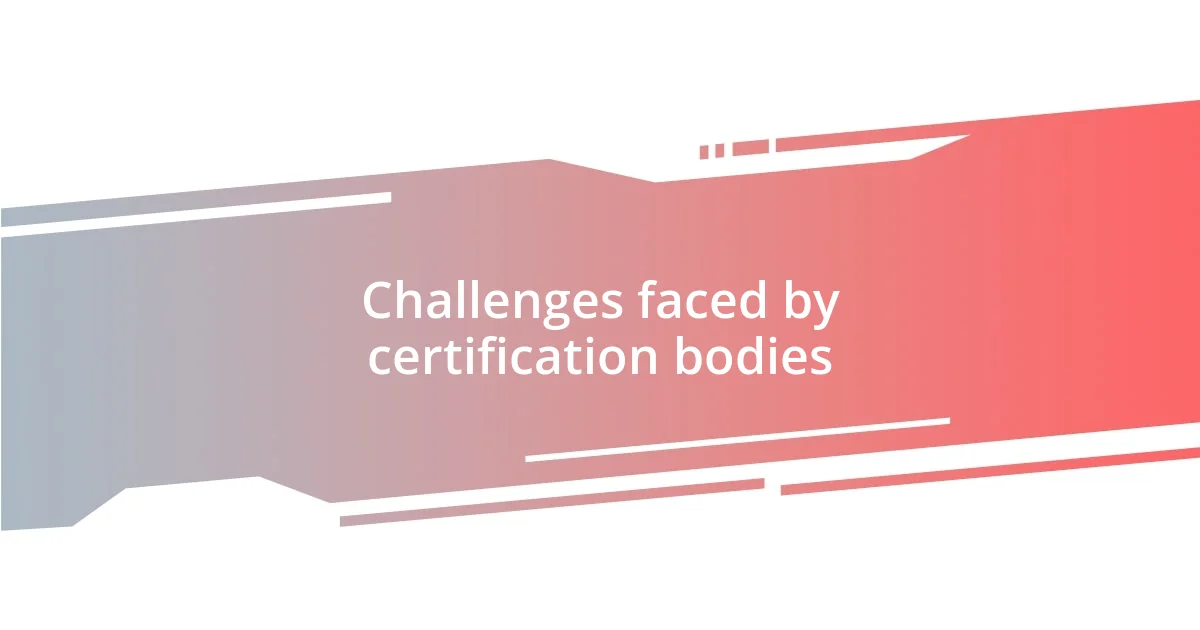
Challenges faced by certification bodies
The landscape of certification bodies is riddled with challenges that can complicate their mission. One significant hurdle is maintaining credibility in a crowded market. I once attended a panel discussion where professionals voiced concerns about the proliferation of certification bodies diluting trust. It made me realize how critical it is for these organizations to not only stand out but consistently deliver on the quality and integrity that their certifications promise.
Additionally, keeping pace with rapid industry changes can be daunting. I recall speaking with a certification manager who expressed frustration about the constant updates needed to align standards with emerging technologies. It left me thinking—how can certification bodies evolve without alienating the businesses relying on them? This balancing act not only demands agility but also a commitment to continuous learning to ensure relevant and effective standards.
Financial constraints also pose significant challenges, particularly for smaller certification bodies. I remember hearing a struggle from a colleague who worked for one; they lacked the resources to hire enough qualified auditors. This led to delays in assessments that left clients anxious. How crucial it is for certification bodies to remain financially viable while upholding their responsibilities! It’s a tightrope walk, reflecting both the importance and difficulty of their role in maintaining industry standards.

Future trends in certification practices
As certification practices evolve, I anticipate a shift toward more flexible and adaptive standards to keep pace with rapid technological advances. Just think about how quickly everything is changing; last year’s best practices might feel outdated today. I remember participating in a workshop where experts discussed how certifications need to embrace agility, allowing organizations to remain compliant while innovating.
Another trend I foresee is the increased integration of digital tools in the certification process. I’ve experienced firsthand the convenience of apps that streamline compliance checks. Imagine a future where companies can manage their certifications in real time, ensuring they meet standards without diving into piles of paperwork. Wouldn’t that revolutionize how we perceive certifications?
Moreover, the growing emphasis on sustainability will likely shape the certification landscape. Reflecting on my experience attending eco-friendly trade shows, it’s clear that businesses are eager to showcase their commitment to the environment. I wonder if we might see a rise in certifications that focus specifically on sustainable practices. As a consumer, how reassuring would it be to know that a product is certified for its eco-friendliness? This shift is not just about meeting regulations; it’s about connecting with values that consumers deeply care about, creating trust and loyalty in the process.













